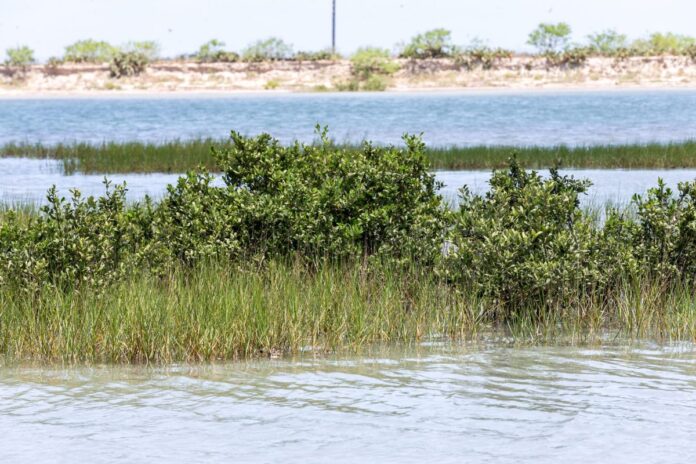BY Cheryl Taylor
Three professors in the UTRGV School of Earth, Environmental and Marine Sciences are among an elite group of scientists awarded two-year research grants as part of the Texas OneGulf Center of Excellence.
UTRGV’s Dr. John “Chip” Breier, associate professor, Dr. David Hicks, professor, and Dr. Hudson DeYoe, professor, in collaboration with Dr. Warren Pulich at the Meadows Center for Water and the Environment at Texas State University in San Marcos, were awarded $213,956 for their proposal, “Developing a predictive ecosystem model for the Lower Laguna Madre.”
Texas OneGulf is one of two consortia established by the Texas Commission on Environmental Quality to enable usage of federal funding provided through the Resources and Ecosystems Sustainability, Tourist Opportunities, and Revived Economies of the Gulf Coast States Act of 2010 (RESTORE Act).
The RESTORE Act requires the five Gulf States affected by the 2010 Deepwater Horizon oil spill – an 87-day discharge of millions of barrels of crude oil into the Gulf of Mexico – to establish centers of excellence for conducting research on the Gulf Coast region.
Texas OneGulf, a consortium of nine Texas institutions, is a unique multi-disciplinary team of marine science, socio-economic and human health researchers united to promote collaborative research and problem-solving actions in support of programs, projects and activities that restore and protect the environment and economy of the Gulf Coast region. The total grant funding for all nine institutions’ research is $2 million.
“Our project will develop a predictive ecological model, with the goal to bring together all of the essential cross-disciplinary information needed to predict future trends in water quality and ecosystem health for the Lower Laguna Madre,” Breier said.
The grant will support the research and education of three graduate students in the new School of Earth, Environmental and Marine Sciences at the new UTRGV Coastal and Ocean Science Center (COSC). Currently in the design stage, a COSC facility will be located on Garcia Street in Port Isabel.
“The Lower Laguna Madre is a vital, unique, and ecologically important region of the Gulf of Mexico, yet it remains terribly data-poor,” Breier said. “Starting immediately, we hope to use retrieved data to begin generating predictions.”
Breier said this is the first step in developing a working predictive model, and that it will improve over time as the dataset and understanding of the system grow.
“Whether the implications of our predictions are good, bad or mixed, the key goal is that the predictions themselves are as accurate as they can be,” he said. “The result of the team’s research will be increased resiliency of our coastal communities and the overall health and well-being of the population.”
Texas OneGulf is led by the Harte Research Institute (HRI) for Gulf of Mexico Studies at Texas A&M University–Corpus Christi.
“We are very appreciative of the governor’s support of Texas OneGulf as it has allowed us to fund these diverse and innovative projects,” said Dr. Larry McKinney, HRI Director. “What happens in the Gulf of Mexico affects the health and economic well-being of Texas citizens on a daily basis, and making sure that we focus the best available science on these issues is the goal of our RESTORE designated Center of Excellence.”




